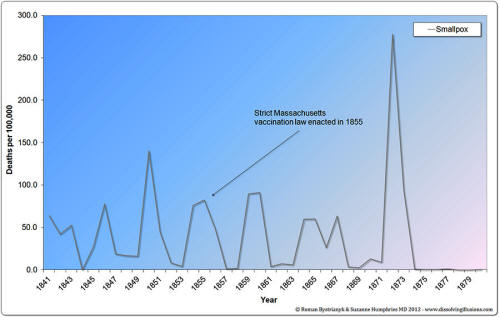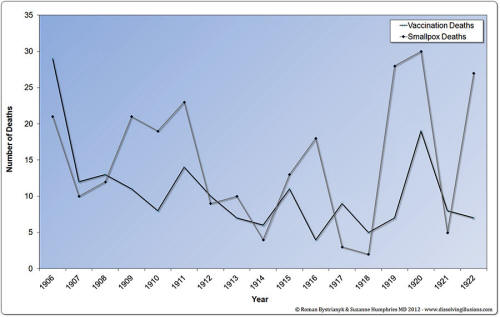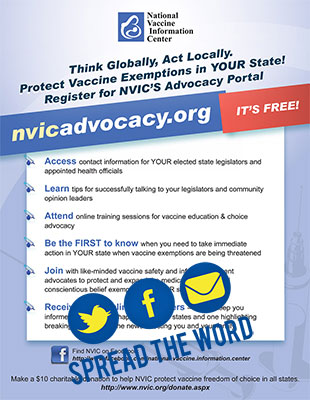|
Vaccines are one of the most controversial medical therapies, and it's impossible to make an informed decision unless you know both sides of the story. In the process of knowing both sides, the historical context is critical.
Dr. Suzanne Humphries, author of Dissolving Illusions - Disease, Vaccines, and the Forgotten History,1 is a nephrologist who has committed the latter part of her medical career to exposing the "lost history" of vaccinations.
Barbara Loe Fisher of NVIC commented that this is one of the rare books that conducted in-depth research documenting the medical history related to mass vaccination programs and infectious diseases.
I have read the book from cover to cover and would strongly recommend that you pick up a copy if you have even the remotest interest in this topic, especially if you believe in the safety and necessity of vaccines, as the comprehensive documentation will likely cause you to reevaluate your position.
It is an absolutely fascinating read, and in some ways demonstrates that enforcement of vaccine programs could be far worse today, when compared to historical standards when people were imprisoned and even killed when they refused to comply.
I will likely reread the book again so I can be well armed to articulately express my concerns on why one needs to have serious reservations on the validity of vaccines, based on historical precedents.
Why This Book Was Written
Dr. Humphries' interest in this area began in 2009, when several of her patients told her that they'd been perfectly healthy until they got one vaccine or another.
Prior to this, she'd been, as she says, "agnostic" about vaccination.
Then she started noticing that her patients were being ordered to get vaccinated on their first day of admission into the hospital - often when they had serious diseases: inflammatory diseases, heart attacks, congestive heart failure, and one patient with cancer on chemotherapy.
Countering Vaccine Arguments Led to Startling Conclusions
The conventional paradigm states that vaccines are safe and effective, and can be given to virtually anybody regardless of how sick they are.
In order to address and counter the arguments she was given for this routine policy, she had to research vaccination, which led her to discover that there is absolutely nothing in the medical literature to support vaccinating an acutely ill person.
Arguments often used by vaccine advocates include the oft-parroted sound byte that 'diseases like smallpox and polio were eradicated by vaccination.' Hence vaccines rank among the greatest medical interventions known.
As a result, she ended up researching smallpox and polio - even though it really had nothing to do with what was happening to her patients.
Alas, this was when Dr. Humphries started coming to some really startling conclusions.
The Story Behind the Smallpox Vaccine
Every vaccine has a story behind it, Dr. Humphries says.
The smallpox vaccine, for example, was actually developed long before the medical establishment knew anything about the human immune system. The revelations on smallpox alone are fascinating enough to purchase this book, and is far more detailed than the summary in this article.
The vaccine was actually developed based on a rumor circulating among dairy maids. The rumor was that when a dairy maid had been infected with cowpox - which is a common infection on the udder of the cow - she would no longer be susceptible to smallpox.
The rumor was a persistent one, as rumors can be, despite the fact that there were plenty of dairy maids who developed smallpox after having cowpox.
But this rumor is what led Edward Jenner to develop the first smallpox vaccine.
When the smallpox vaccine was developed, there was also no way to accurately diagnose the type of pox disease a person had.
It may have been chickenpox, monkeypox, or smallpox, but back then, any kind of pox disease was considered smallpox - even though the vaccine didn't actually have the human smallpox virus in it.
Animal pox virus was always used.
According to Dr. Humphries, it was the most contaminated vaccine that's ever been on the market.
Antibody Is the Wrong Way to Ascertain Immunity
One of the major arguments against vaccine-induced immunity is that it primarily stimulates the humoral immune system and not the cellular immune system.
Antibodies are produced by the humoral immune system and then routinely measured to determine "immunity." The problem with this approach is that you can have high antibody levels and still get the disease.
It's very difficult and expensive to measure the cellular immune response, and immunologists admit that they are still in the dark about a lot of the finer points of the overall immune response.
When you use antibody titers or blood levels to check for immunity, all you're doing is getting a picture of what happened (you had an immune response); it doesn't tell you whether you're going to be immune in the future, because antibodies are only one aspect of the immune response, and in some cases are not even necessary to easily combat the sickness and become immune.
For example, those with agammaglobulinemia - a disease where you cannot make antibodies - can get infected with measles, recover uneventfully, and still respond to subsequent challenges of the virus in a normal healthy fashion and not get sick.
These individuals will have lifelong immunity to measles, the same as someone without agammaglobulinemia.
Traditionally, the way immunity is determined is to do a test that measures antibodies, which is the humoral immune system. But there's no good way to assess the cellular immune system. It's a really imprecise science at best.
As Dr. Humphries notes:
The Story Behind the Polio Vaccine
The other prime argument for the justification and support of today's highly aggressive vaccination program is the alleged success of the polio vaccine.
But here again, the historical perspective fails to support the vaccination paradigm.
Before the Salk vaccine became available, if you were admitted to the hospital any doctor could diagnose you with polio based on two physical examinations within 24 hours, to check for paralysis in one or more muscle groups.
We now know that a number of viruses can cause paralysis, but back then, all instances were thought to be due to polio virus. When the polio vaccine was developed, a problem emerged. Swedish scientists were trying to tell the US scientists that formaldehyde inactivation was not going to work as planned.
Their warning, however, fell on deaf ears. This was unfortunate, as they turned out to be correct. Live poliovirus, which was put in an injectable vaccine, would appear to be inactivated right after it was made, but sometimes it would "resurrect" in the vial...
In essence, the formaldehyde did not kill off all the polioviruses in these vaccines, which led to live polio viruses being injected. As a result, more people developed paralysis from the vaccine in 1955 than would have developed it from a wild, normal natural poliovirus.
Something had to be done to make it appear as though the vaccine was working.
So what they did was change the diagnostic criteria for polio. Sadly this is a very common practice in medicine. When the observations don't fit your expectations, change or rig the system so that they do. With polio, the original criteria was two examinations within 24 hours. This was changed to two examinations within 60 days.
This was helpful in cooking the books, because within 60 days, most people recover from their bout with poliomyelitis.
Then there was the issue of testing.
Prior to the vaccine, there was no testing done on blood or stool samples. After the vaccine came along, there was an epidemic in Michigan around 1958.
About 2,000 people were diagnosed with polio. In disbelief over the outbreak, serological testing was done, and they discovered that the polio virus was found in only a small minority - about one-quarter of those who displayed symptoms of infection.
Interestingly, in the remainder they discovered a different virus or no virus at all!
And, subsequently, those patients were no longer "counted" as having polio.
Oral Polio Vaccine Propagates Transmission of Vaccine Virus
It's important to realize that the injected polio vaccine does nothing to prevent transmission of the virus, and after an oral polio vaccine you become a reservoir of virus that can mutate or combine with other bowel viruses, creating new strains that are often more virulent to those around you.
According to Dr. Humphries, the only thing the injectable vaccine theoretically does is give you some blood immunity, similar to tetanus. This means it is only going to be effective if your blood meets the virus before the virus meets your nervous system.
Once vaccine makers realized just how difficult it was to inactivate the polio virus, and many people ended up contracting polio from the vaccine, they decided to abandon the injectable polio vaccine and create an oral vaccine instead, which is more similar to the natural route of infection.
Again, controversy ensued.
The oral vaccine did interrupt transmission of the wild type virus, but it propagated transmission of the vaccine virus instead.
In the 1990s the US quit using the oral vaccine, and switched back to the injectable vaccine.
To address the hazards of injecting improperly or inadequately inactivated polio virus, certain adjustments to the formulation were made. Modern polio vaccines are propagated and inactivated differently from earlier versions, and different countries also use different strains of the polio virus. Older polio viruses used to contain three strains of the virus.
Today, some countries will only use one or two.
Polio Was 'Eradicated' NOT by the Vaccine But Through Redefinition
As noted by Dr. Humphries, it's very easy to defeat the polio vaccine argument, as most incidences of polio disappeared because the disease was redefined - not because there was an actual change in disease prevalence.
In fact, it could be argued that the vaccine did more harm than good, since some versions caused polio, and others propagated new mutated strains of the virus. According to Dr. Humphries, at one point, the only polio cases in the US were vaccine-induced.
Yet even though there are no cases of wild polio being discovered, the polio vaccine remains part of the US vaccine program...
Polio Epidemic Historically Related to Increase in Sugar Consumption
Here's another interesting tidbit that no one ever talks about: In the past, it has sometimes been suggested that a large part of the polio epidemic was related to increases in sugar consumption.
Dr. Benjamin Sandler wrote an entire book about this, and Dr. Humphries refers to his work in her book as well.
She explains the connection as follows:
DDT exposure has also been linked to Alzheimer's disease, and it's worth noting that the contemporary equivalent of DDT, glyphosate, according to Dr. Don Huber, professor emeritus at Purdue University, is far more toxic than DDT.
It definitely has been shown to decimate your microbiome, and glyphosate preferentially kills bacteria known to be beneficial for human health.
'You Cannot Dabble in the Topic of Vaccination'
Dr. Humphries left a successful practice making $300,000 a year to be a poorly paid researcher.
For her it was worth it, because her integrity wouldn't allow her to turn a blind eye to what she knew to be wrong.
Science of Epigenetics Changes Everything Yet Again...
Epigenetics is another field where biology is being turned on its head and all the old paradigms are being tossed out.
Epigenetic science now tells us that our genes are NOT our destiny, and the problem is that once you start to epigenetically tinker with the infant immune system, you are basically depositing what Dr. Humphries refers to as "little cluster bombs" that will eventually "explode into a big problem."
As an example, she cites a study by Nikolaj Orntoft, in which African girls were injected with a tetanus vaccine to see which genes might be upregulated or downregulated.
What they found is that there's really no way to predict which genes will be affected.
So not only will each individual have a unique response to any given vaccine, based on their current health status, we're also epigenetically predisposed to respond differently in terms of the side effects we might develop.
This means that having a vaccine compensation table for reimbursement for vaccine damage is nonsensical as we're bound to have different genes upregulated after vaccines are given.
Most Doctors Are Completely Uninformed, Which Means You Cannot Make an Informed Choice
Dr. Humphries stresses the importance of "thinking long and hard" about how much information you've been given before your child is given a vaccine.
We really need to understand each disease - what the risk of it is, how it's transmitted, what the vaccine effectiveness is, and what the risks are.
Dr. Humphries also notes that the human body is designed in such a perfect way that there is a system in place to handle just about anything that happens to it, provided we've treated our body properly.
More Information
People have been scared into believing vaccines are the answer to prevent disease, but when you look at the historical evidence, the arguments used simply fall apart.
There's just no question that improving your innate immune system - through reducing sugar and processed foods in your diet, improving your gut flora, leading a healthy lifestyle, and having adequate vitamin D levels, ideally through sensible sun exposure - will provide a far more effective immune response and virtually eliminate any risk of developing a life threatening infection.
The key is to have the courage to trust in this truth - that your body is designed to maintain health. Its natural course and direction is to be healthy not sick. If you have a healthy lifestyle, exposure to nearly all of these infectious agents will ultimately make you healthy and stronger.
This is similar to exercise, which actually tears your body down to make it stronger. Nature actually knows what it's doing, whereas putting chemicals into your body based on human theories (or rumors!) that are oftentimes completely wrong, is unlikely to produce better results.
As noted by Dr. Humphries:
To learn more, I couldn't more highly recommend Dr. Humphries excellent book, Dissolving Illusions - Disease, Vaccines, and the Forgotten History.
You can also find more information on the book's website, dissolvingillusions.com.
I have read it cover to cover and plan on doing so again as there are loads of powerful information that helps combat the blindly foolish acceptance of nearly all media and professionals on the value of vaccinations.
Protect Your Right to Informed Consent and Defend Vaccine Exemptions
With all the uncertainty surrounding the safety and efficacy of vaccines, it's critical to protect your right to make independent health choices and exercise voluntary informed consent to vaccination.
It is urgent that everyone in America stand up and fight to protect and expand vaccine informed consent protections in state public health and employment laws.
The best way to do this is to get personally involved with your state legislators and educating the leaders in your community.
THINK GLOBALLY, ACT LOCALLY
National vaccine policy recommendations are made at the federal level but vaccine laws are made at the state level. It is at the state level where your action to protect your vaccine choice rights can have the greatest impact.
It is critical for EVERYONE to get involved now in standing up for the legal right to make voluntary vaccine choices in America because those choices are being threatened by lobbyists representing drug companies, medical trade associations, and public health officials, who are trying to persuade legislators to strip all vaccine exemptions from public health laws.
Signing up for NVIC's free Advocacy Portal at www.NVICAdvocacy.org gives you immediate, easy access to your own state legislators on your Smart Phone or computer so you can make your voice heard.
You will be kept up-to-date on the latest state bills threatening your vaccine choice rights and get practical, useful information to help you become an effective vaccine choice advocate in your own community.
Also, when national vaccine issues come up, you will have the up-to-date information and call to action items you need at your fingertips.
So please, as your first step, sign up for the NVIC Advocacy Portal.
Video
Dr. Mercola Interviews Dr. Humphries
References
|




